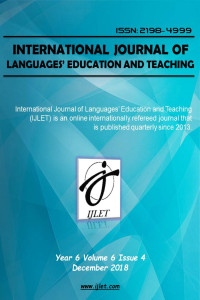Abstract
In recent years critical perspectives have developed in second language teaching within the framework of poststructuralism. Participatory approach has been deliberately ignored in second language education owing to its severe criticism towards other modern approaches. This study aimed to unearth the views of Turkish adult learners of English regarding the topics on the agenda in Turkey and the world. The participants were given a list of topics discussed in the media and asked whether they discussed any of these topics composed of political, social and cultural issues. The results of the study show that none of the topics were discussed in the classroom setting. In addition, the participants were asked what topics they encountered in the preceding month and whether their English teacher used participatory approach in the class. Although the participants mentioned that participatory approach and the topics on the agenda could be useful to debate in classroom settings, the teachers were reported not to have used this critical approach at all. They stated that the teachers focused on skills more than critical and risky topics owing to different reasons such as political and cultural factors.
References
- Atkinson, D. (2002). Toward a sociocognitive approach to second language acquisition. The Modern Language Journal, 86(4), 525-545.
- Auerbach, E. (1995). The politics of the ESL classroom: Issues of power in pedagogical choices. In J. Tollefson (Ed.), Power and inequality in language education (pp. 9-33). New York: Cambridge University Press.
- Auerbach, E. (2001). “Yes, but…”: Problematizing participatory ESL Pedagogy. In P. Campbell & B.
- Bunaby (Eds.), Participatory practices in adult education (pp. 267-306). Mahwah, NJ: Lawrence Erlbaum.
- Berlin, L. (2005). Contextualizing college ESL classroom praxis: A participatory approach to effective instruction. New York: Routledge.
- Carr, W. & Kemmis, S. (1986). Becoming Critical: Education, knowledge and action research. London: The Falmer Press.
Abstract
References
- Atkinson, D. (2002). Toward a sociocognitive approach to second language acquisition. The Modern Language Journal, 86(4), 525-545.
- Auerbach, E. (1995). The politics of the ESL classroom: Issues of power in pedagogical choices. In J. Tollefson (Ed.), Power and inequality in language education (pp. 9-33). New York: Cambridge University Press.
- Auerbach, E. (2001). “Yes, but…”: Problematizing participatory ESL Pedagogy. In P. Campbell & B.
- Bunaby (Eds.), Participatory practices in adult education (pp. 267-306). Mahwah, NJ: Lawrence Erlbaum.
- Berlin, L. (2005). Contextualizing college ESL classroom praxis: A participatory approach to effective instruction. New York: Routledge.
- Carr, W. & Kemmis, S. (1986). Becoming Critical: Education, knowledge and action research. London: The Falmer Press.
Details
| Primary Language | English |
|---|---|
| Subjects | Language Acquisition, Applied Linguistics and Educational Linguistics |
| Journal Section | Research Article |
| Authors | |
| Publication Date | December 30, 2018 |
| Published in Issue | Year 2018 Volume: 6 Issue: 4 |


